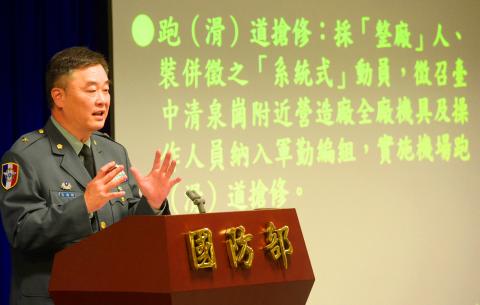The next installment of the annual Han Kuang military exercise is to reflect the military’s doctrinal shift from annihilation of the enemy to prevention of victory for the aggressor, a military official said yesterday.
The 34th Han Kuang exercise is to consist of a computer-assisted military simulation from Monday to Friday next week, as well as live-fire drills from July 4 to July 8, the general staff’s Chief of Joint Operations Major General Yeh Kuo-hui (葉國煇) told a news conference in Taipei.
The computer-assisted drill is designed to examine the soundness of the military’s Ku An operation plan and its success is not contingent on achieving victory, he said, adding that this would be a departure from past practice.

Photo: Chang Chia-ming, Taipei Times
The live-fire portion is to emphasize realism, mobilization of civilian assets, augmentation of the military’s reserve capabilities, combat under degraded command and control capabilities, and integration of the annual Wan An air raid drill, Yeh said.
For some portions of live-fire exercise, civilian assets — including Chunghwa Telecom Co (CHT, 中華電信), industries near the Ching Chuan Kang Air Base in Taichung and civilian drone operators — would be incorporated, he said.
Civilian organizations are to assist in tasks such as maintaining communication channels with cell sites, repairing damaged runways, battlefield imaging and information management, he said.
The growing gap in military resources between Taiwan and China has made the military’s traditional doctrine of emphasizing the destruction of enemy forces “not suited for the times and unachievable,” a Ministry of National Defense official said on condition of anonymity.
The live-fire drills are to involve mock air, sea and land battles during the day and night, with military units assuming attacking and defending roles, the official said.
The mock battles are intended to portray the asymmetric warfare conditions that the military believes to most realistically simulate a war with China, so it is reorienting its strategy toward preventing China’s People’s Liberation Army from conquering Taiwan, he said.
The doctrine — which had previously been elaborated by military officers — is now the guiding principle for building the armed forces, he said.
The focus on asymmetric warfare is to result in an increased emphasis on mobility, and distributing capabilities geographically and systematically to mitigate vulnerability from targeted strikes, he said.
In arms procurement, it signals a preference for weapons that prioritize efficiency, survivability, precision-strike capabilities and quality over quantity, he said.
The doctrine might favor the procurement of fast and stealthy systems that are compatible with swarm tactics, including rapid mine deployment-capable minelayers, submarines, guided missile attack boats, mobile air-defense systems, mobile anti-armor platforms, precision guided munition-firing tube artillery and self-propelled multiple launch rocket systems, he said.
The exercise’s arrangement shows that the military intends to distribute its systems and build up reserves by commandeering civilian drone resources, he said.

US President Donald Trump yesterday announced sweeping "reciprocal tariffs" on US trading partners, including a 32 percent tax on goods from Taiwan that is set to take effect on Wednesday. At a Rose Garden event, Trump declared a 10 percent baseline tax on imports from all countries, with the White House saying it would take effect on Saturday. Countries with larger trade surpluses with the US would face higher duties beginning on Wednesday, including Taiwan (32 percent), China (34 percent), Japan (24 percent), South Korea (25 percent), Vietnam (46 percent) and Thailand (36 percent). Canada and Mexico, the two largest US trading

AIR SUPPORT: The Ministry of National Defense thanked the US for the delivery, adding that it was an indicator of the White House’s commitment to the Taiwan Relations Act Deputy Minister of National Defense Po Horng-huei (柏鴻輝) and Representative to the US Alexander Yui on Friday attended a delivery ceremony for the first of Taiwan’s long-awaited 66 F-16C/D Block 70 jets at a Lockheed Martin Corp factory in Greenville, South Carolina. “We are so proud to be the global home of the F-16 and to support Taiwan’s air defense capabilities,” US Representative William Timmons wrote on X, alongside a photograph of Taiwanese and US officials at the event. The F-16C/D Block 70 jets Taiwan ordered have the same capabilities as aircraft that had been upgraded to F-16Vs. The batch of Lockheed Martin

GRIDLOCK: The National Fire Agency’s Special Search and Rescue team is on standby to travel to the countries to help out with the rescue effort A powerful earthquake rocked Myanmar and neighboring Thailand yesterday, killing at least three people in Bangkok and burying dozens when a high-rise building under construction collapsed. Footage shared on social media from Myanmar’s second-largest city showed widespread destruction, raising fears that many were trapped under the rubble or killed. The magnitude 7.7 earthquake, with an epicenter near Mandalay in Myanmar, struck at midday and was followed by a strong magnitude 6.4 aftershock. The extent of death, injury and destruction — especially in Myanmar, which is embroiled in a civil war and where information is tightly controlled at the best of times —

China's military today said it began joint army, navy and rocket force exercises around Taiwan to "serve as a stern warning and powerful deterrent against Taiwanese independence," calling President William Lai (賴清德) a "parasite." The exercises come after Lai called Beijing a "foreign hostile force" last month. More than 10 Chinese military ships approached close to Taiwan's 24 nautical mile (44.4km) contiguous zone this morning and Taiwan sent its own warships to respond, two senior Taiwanese officials said. Taiwan has not yet detected any live fire by the Chinese military so far, one of the officials said. The drills took place after US Secretary